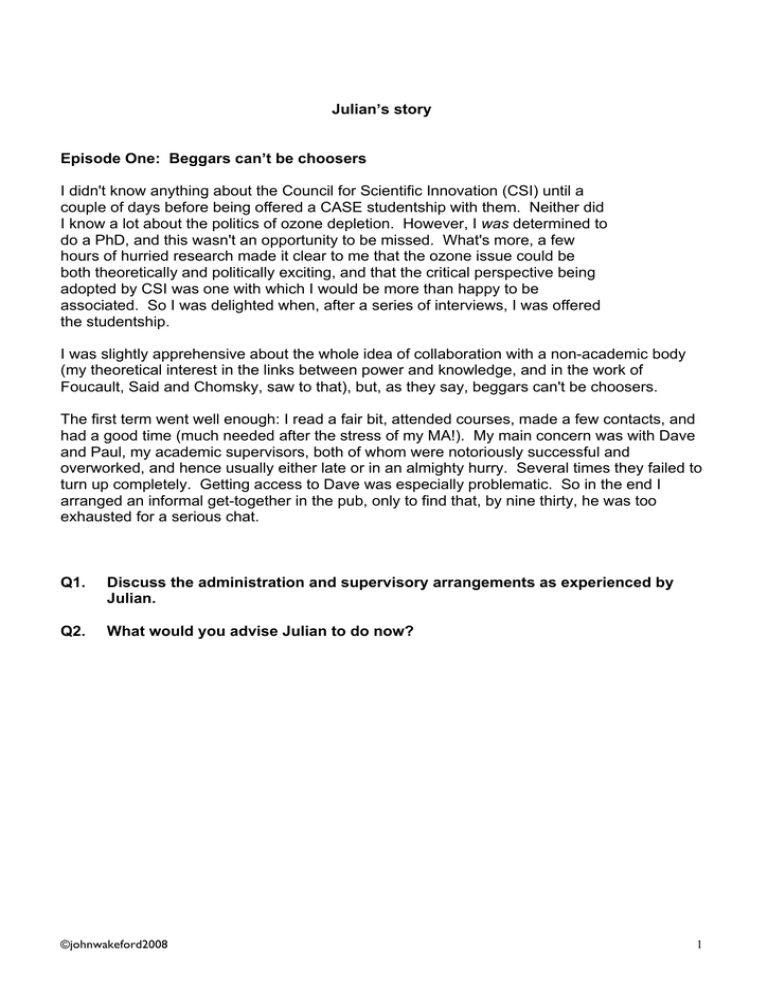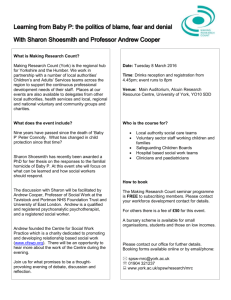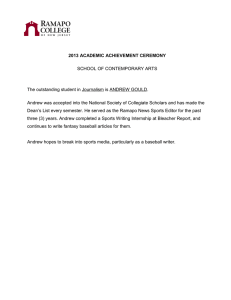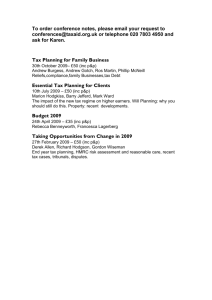Julian’s story Episode One: Beggars can’t be choosers
advertisement

Julian’s story Episode One: Beggars can’t be choosers I didn't know anything about the Council for Scientific Innovation (CSI) until a couple of days before being offered a CASE studentship with them. Neither did I know a lot about the politics of ozone depletion. However, I was determined to do a PhD, and this wasn't an opportunity to be missed. What's more, a few hours of hurried research made it clear to me that the ozone issue could be both theoretically and politically exciting, and that the critical perspective being adopted by CSI was one with which I would be more than happy to be associated. So I was delighted when, after a series of interviews, I was offered the studentship. I was slightly apprehensive about the whole idea of collaboration with a non-academic body (my theoretical interest in the links between power and knowledge, and in the work of Foucault, Said and Chomsky, saw to that), but, as they say, beggars can't be choosers. The first term went well enough: I read a fair bit, attended courses, made a few contacts, and had a good time (much needed after the stress of my MA!). My main concern was with Dave and Paul, my academic supervisors, both of whom were notoriously successful and overworked, and hence usually either late or in an almighty hurry. Several times they failed to turn up completely. Getting access to Dave was especially problematic. So in the end I arranged an informal get-together in the pub, only to find that, by nine thirty, he was too exhausted for a serious chat. Q1. Discuss the administration and supervisory arrangements as experienced by Julian. Q2. What would you advise Julian to do now? ©johnwakeford2008 1 Episode Two: Defection My next strategy was to push Dave and Paul to make appointments with each other. This they duly did, and so I had my first supervisory session towards the end of the first term, and another in the middle of the second. My hunch - that they'd be quite keen to spend a bit of time together - proved correct; the drawback was that they spent too much of their time swapping ideas and papers between themselves, and seemed to get more out of the sessions than I did. I wasn't too worried - I'm quite self-directed and self-disciplined, and, in any case, there were plenty of other academics with whom I could discuss my work. One of these was Stuart who was something of an expert on atmospheric and energy issues, and it was through him that I managed to get funding to attend an EU ozone conference in Madrid. This was a fabulous, eye-opening, even overwhelming experience. I spent most of the time either sitting towards the back of the conference hall, taking notes on proceedings, or hanging around and chatting with Andrew, Director of CSI, others from the Council, and any other important and interesting people I could lay my hands on. The link with Andrew and company was immensely useful: it was from them that I learnt most of the gossip and inside information, and it was through the connection with them that I managed to network with others. Networking, I discovered, is a twoway affair, and as a first year PhD student I simply didn't have anything enlightening to say to anyone. Armed with CSI's arguments and graphics, I at least had some means of striking up conversations. The only problem was that I found myself disagreeing, to an ever-increasing extent, with some of CSI's central arguments, and found myself increasingly sympathetic towards the line being taken by CSI's arch-enemies in the Campaign for Sustainable Resource Management. Andrew and I discussed these issues at length. He failed to change my mind, but we still got on reasonably well. He seemed to respect me intellectually, and I certainly admired his obsessive dedication to the issues and the cause, and I didn't mind in the slightest when he mildly accused me of being a 'defector'. Q3. List the issues raised so far. Q4. What should Julian do now? ©johnwakeford2008 2 Episode Three: Setting up the supervisory team Back at the university, I quickly wrote up a few amorphous thoughts on my experiences in Madrid, presenting them at a departmental postgraduate seminar. My ideas and anecdotes were pretty well received, which was nice and affirming. Sometime after, I sent a copy of my 'think-piece' to Andrew. In the light of my experiences in Madrid, I then busied myself with the task of narrowing down the focus of my research, such that my analysis would come to centre on a single policy mechanism. My hope was that, in addition to raising a wealth of empirical and theoretical questions, adopting this focus would allow me to avoid a head-on collision with CSI, and at the same time explore a set of issues in which the Council did not yet have expertise. I chatted with Andrew about my new research idea. He was always incredibly difficult to pin down, but he seemed happy enough, and didn't express any particularly strong reservations about what I was up to. Around the same time, I was endeavouring to straighten out my academic supervision as I was starting to foresee the time when I'd need some pretty firm guidance. Matthew, the CASE studentship supervisor, was a big help here, recognising that neither Dave nor Paul were being, nor were likely to be, much good for me. Happily, Paul saw this too, and was quite prepared to take a back seat. Dave was just so permanently absent that we decided not to worry about him. It was all remarkably unproblematic, and now I had three young, interested and not too famous supervisors, each with their own forte and role: Sean, with his knowledge of international relations theory and critical realism; Stuart, with his expertise in atmospheric science and energy policy; and Matthew, with his understanding of the sociology of science, and his role as head honcho and whip-cracker for when the going gets tough. This was a really good set-up, and I was delighted with it. Q5. Identify any outstanding and still unresolved problems. Q6. What would you advise Julian to do about them? ©johnwakeford2008 3 Episode Four: The enemy within But I'm running ahead of myself. Within a week or so of sending Andrew my papers, he was on the 'phone to Jim, my Head of Department, complaining vehemently about me and demanding some kind of debate. I rang him up immediately, and was received first with angry silence (of the 'I don't want to talk to you, I've explained everything to Jim already' variety), and then with a wave of hostility which verged on abuse and lasted for a full hour. Apparently, I had been utterly wrong in my interpretation of the state of ozone politics; I was guilty of misrepresenting and being downright aggressive towards CSI; and I had been slandering, even libelling, the Council in a public forum. Andrew demanded the right of reply, and pretty much ordered me to set about organising a ‘public debate’ at the University, at which the two of us would presumably do battle in some kind of insane intellectual beauty contest. I told him in no uncertain terms that I thought this was a bad idea, and instead proposed a meeting between himself, my supervisors and me, at which I hoped we'd be able to resolve some of our difficulties. Unfortunately, he wasn't interested in this. He seemed to have decided that I now belonged to the category of 'enemy', deserving of humiliation rather than reconciliation. The 'phone call ended without any semblance of compromise or agreement. I felt like jelly, totally wrecked. Q7. Highlight the nature of the new issues that have arisen. Q8. What would you advise Julian to do about them? ©johnwakeford2008 4 Episode Five: Ultimatum Andrew seemed to have reacted out of all proportion to events. True, some of my paper was critical of CSI. Admittedly, some of my language was a bit blunt. I'd readily admit to having been somewhat naive in not recognising how much more carefully one has to tread with the written than with the spoken word. But beyond this, I don't think I was at fault. Andrew seemed to be making every effort to misconstrue my paper. Perhaps Andrew was consciously trying to transform my molehill of a paper into a mountainous conflict. Perhaps he was just looking for an excuse to get out of an arrangement which would cost him and his cash-strapped Council around seven grand over three years, and which might well yield no tangible benefit. Or perhaps it was just Andrew being himself. People had told me what a difficult person he could be to work with (phrases like 'megalomaniac', 'charismatic despot' and 'one-man Council' had been bandied around), and now I was being treated to some first hand experience. From the outset, my supervisors, my Head of Department and other academics at the Uni gave me their full support. Matthew rang up Andrew within a couple of days, but his attempt at peacemaking got nowhere. Then Matthew, Jim and I met to work out a strategy, the outcome being a letter to Andrew outlining the state and shape of my research project, and asking for a speedy clarification of whether this was acceptable or not. Clearly it was not: Andrew rang me at home at eight o'clock in the morning a couple of days later, and entertained me, once more, to a barrage of fiery words. I didn't want to talk with him, as the letter hadn't even come from me and his motivation for ringing me rather than Matthew, who'd signed the letter, seemed to be no less than to bully me into submission. We were still deadlocked. Again Matthew spoke with Andrew. This time, it became clear what his demands were: first, that I formally and publicly retract my paper on Madrid; and second, that the focus of my research change such that I undertake a series of literature reviews directly pertaining to CSI's campaigning needs. Q9. How should Jim and Mathew react to Andrew’s demands? Q10. What should Julian do now? ©johnwakeford2008 5 Episode Six: Resolution Faced with this ultimatum, I felt I had no option but to bring the collaboration to an end. My supervisors agreed. Andrew had previously okayed the direction of my research, and now he was imposing new demands; I was being asked to retract a paper which only half a dozen people had read; and, on a more fundamentally practical level, neither Andrew nor I trusted each other in the slightest. I wrote to Andrew explaining why I was unwilling to withdraw my Madrid paper, and, in the meantime, Jim and Matthew set about trying to convert my CASE studentship to a standard ESRC scholarship. Jim reckoned that, since I'd behaved in the large part quite properly, getting the studentship converted wouldn't be too much of a problem. And so it has turned out. The ESRC have just agreed to convert my award. They gave me a bit of a ticking off, calling my behaviour inflammatory and irresponsible, and they also had a bit of a go at my supervisors for not keeping an eye on my every move, and for not training me properly in transferable skills such as communication, negotiation and team work. All a bit over the top, but at least I've got my freedom and my money now; I just hope there aren't any more repercussions from the whole sordid affair for either me or the department. And maybe I can now get on with some research. Q11. Comment on the behaviour of: a) b) c) d) Mathew (co-ordinating supervisor) Jim (Head of Department) Julian (the student) Andrew (the main contact in the CASE sponsoring organisation) Team Task: Draw up, on the acetate provided, guidelines for departments launching into collaborative or sponsored postgraduate research awards. ©johnwakeford2008 6



